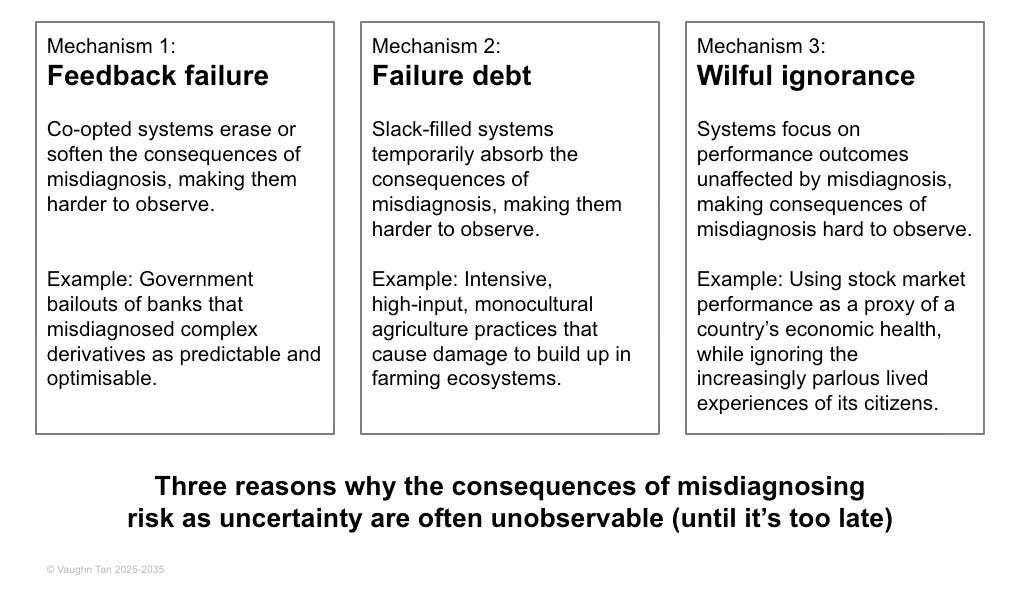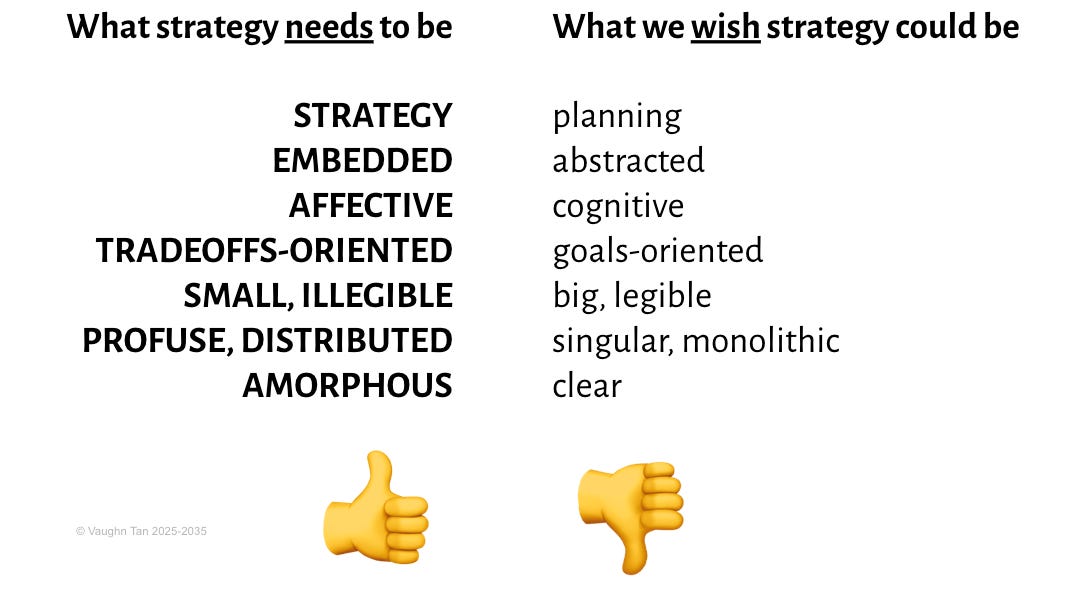
Strategy
/strategy326
Discussing strategy, in any area
Innovation stalls when we treat uncertainty like risk.
In my latest article, I share a 4-day program helping public sector teams embrace uncertainty as a strategic resource—not a threat to be planned away. Ready to transform policy work in your govt?
https://vaughntan.org/transformpolicy
In my latest article, I share a 4-day program helping public sector teams embrace uncertainty as a strategic resource—not a threat to be planned away. Ready to transform policy work in your govt?
https://vaughntan.org/transformpolicy
Strategy ≠ planning. Efficiency ≠ resilience. Interviews ≠ casual chats. AI ≠ meaningmaking. Grab bag of ideas on how we get it wrong — and how to get it right.
👉 https://uncertaintymindset.substack.com/p/gbw1425
👉 https://uncertaintymindset.substack.com/p/gbw1425
The FT's new piece on economic uncertainty gives me another opp to point out that uncertainty /= risk: https://vaughntan.org/uncertaintyrisk
and the consequences of mistaking uncertainty for risk: https://vaughntan.org/the-consequences-of-mindset-mismatch
and why it's valuable to understand the difference: https://uncertaintymindset.org/
Here's the FT piece: https://www.ft.com/content/26d15d7e-dd36-4ca1-b974-da8a57bce290
and the consequences of mistaking uncertainty for risk: https://vaughntan.org/the-consequences-of-mindset-mismatch
and why it's valuable to understand the difference: https://uncertaintymindset.org/
Here's the FT piece: https://www.ft.com/content/26d15d7e-dd36-4ca1-b974-da8a57bce290

True uncertainty ≠ formal risk - Vaughn Tan
Formal risk (which is comfortingly quantifiable and optimisable) is not the same thing as true uncertainty. At this moment, it’s not an exaggeration
vaughntan.org
The consequences of mindset mismatch - Vaughn Tan
tl;dr: Mindset mismatch is when the mindset you use to interpret and act in the world inaccurately reflects reality. All mindsets are inaccurate in
vaughntan.org
hello hello economists and finance types who believe that uncertainties are modelable
just curious: are you doing your decisionmaking in the current market situation one using cost-benefit analysis? what about expected value calculations?
asking for a friend
just curious: are you doing your decisionmaking in the current market situation one using cost-benefit analysis? what about expected value calculations?
asking for a friend
Public sector orgs don’t just need efficiency and planning — they need strategy, resilience, and the right kind of slack.
Read more here: https://vaughntan.org/efficiencytrap
Read more here: https://vaughntan.org/efficiencytrap
i've been writing + consulting
about how uncertainty is different from risk for almost 20 yrs. we're going through a profound reordering now and it must be interpreted + acted on as uncertainty, not as risk.
risk-management doesn't work when everything is cray.
https://vaughntan.org/uncertaintyrisk
about how uncertainty is different from risk for almost 20 yrs. we're going through a profound reordering now and it must be interpreted + acted on as uncertainty, not as risk.
risk-management doesn't work when everything is cray.
https://vaughntan.org/uncertaintyrisk
just joined a panel on government digitalisation and efficiency for civil servants from across a country's government.
always taken aback when i run across public sector institutions that:
1. think of strategy as planning
2. imagine that futures 25 years out are predictable enough to "plan rigorously for" using risk methods like cost-benefit analyses, instead of actually being unquantifiably uncertain
3. desperately want to be efficient like private sector orgs
4. don't recognise that efficiency requires adaptation to current conditions = being fragile to changes in conditions
always taken aback when i run across public sector institutions that:
1. think of strategy as planning
2. imagine that futures 25 years out are predictable enough to "plan rigorously for" using risk methods like cost-benefit analyses, instead of actually being unquantifiably uncertain
3. desperately want to be efficient like private sector orgs
4. don't recognise that efficiency requires adaptation to current conditions = being fragile to changes in conditions
was at a briefing about AI hardware last week and probably the most interesting question brought up which i hadn’t thought about at all previously was “what happens to the development and use model for chips superseded by the current latest generation of chips?”
quick thought is that something analogous to the export used-car market will happen: the premium, high-margin, charismatic applications run on the latest hardware and the older hardware is used to run prosaic, everyday applications. compared to the latest hardware,
access to older hardware is much broader and more democratic.
there is longer time-in-use when using older hardware.
more time is available for developing more efficient ways of using older hardware.
this will be good for the development of small, usage-specific applications — the kinds of applications that maybe Clay Shirky might think of as “situated software.”
quick thought is that something analogous to the export used-car market will happen: the premium, high-margin, charismatic applications run on the latest hardware and the older hardware is used to run prosaic, everyday applications. compared to the latest hardware,
access to older hardware is much broader and more democratic.
there is longer time-in-use when using older hardware.
more time is available for developing more efficient ways of using older hardware.
this will be good for the development of small, usage-specific applications — the kinds of applications that maybe Clay Shirky might think of as “situated software.”
on 2 calls today the question arose of how to set long-term goals in changing environments. my 2c is: concrete KPIs don't work over many decades, and rarely even work within a single quarter when circumstances are changing fast.
instead of setting concrete KPIs as long-term goals try articulating how to recognise 1) success, 2) movement in direction of success, 3) movement away from success.
instead of setting concrete KPIs as long-term goals try articulating how to recognise 1) success, 2) movement in direction of success, 3) movement away from success.
This is a great example of working backwards from a user's context.
Viewers want to see multiple events at once. Analog approach says, "we can't fix distribution, so let's combine at the point of reception." Google says, "Let's become an intermediate value-added source — that already has distribution access — and remove the cost/burden on the customer side."
Be the set-top box you wish to see in the world.
From today's Stratechery
https://stratechery.com/2025/youtube-tv-wiz-and-why-monopolies-buy-innovation
Viewers want to see multiple events at once. Analog approach says, "we can't fix distribution, so let's combine at the point of reception." Google says, "Let's become an intermediate value-added source — that already has distribution access — and remove the cost/burden on the customer side."
Be the set-top box you wish to see in the world.
From today's Stratechery
https://stratechery.com/2025/youtube-tv-wiz-and-why-monopolies-buy-innovation
Most strategic mistakes don’t come from just bad planning. They come from misdiagnosing the types of unknowns your strategy is set up to deal with. And the consequences of misdiagnosis are rarely obvious — until it's too late.
More here: https://uncertaintymindset.substack.com/p/dontwait
More here: https://uncertaintymindset.substack.com/p/dontwait
when we call something a "risk," we instinctively apply risk-management methods for making decisions about it (such as cost-benefit analysis, expected value analysis). the problem is that many things we label as "risks" are actually uncertainties: they aren't well-understood and quantifiable enough for the assumptions needed for CBA/expected value analysis to hold.
more on this here: https://vaughntan.org/how-to-think-more-clearly-about-risk
more on this here: https://vaughntan.org/how-to-think-more-clearly-about-risk
i'm writing a series on 7 misunderstandings of strategy. this is #3, about why good strategy must account for affect/emotion and not be over-focused on cognition.
read them all here: https://vaughntan.org/strategy
will post the full essay by end of the week. meanwhile, as a series of casts below 👇
read them all here: https://vaughntan.org/strategy
will post the full essay by end of the week. meanwhile, as a series of casts below 👇
in the last few weeks, I've been asked to make a bunch of introductions. most of the requests made doing the introductions both harder and less effective.
so i finally wrote up guidance on how to ask for an introduction: https://vaughntan.org/fir
(it's based on what i do, and what i recommend my students do)
so i finally wrote up guidance on how to ask for an introduction: https://vaughntan.org/fir
(it's based on what i do, and what i recommend my students do)
I’m writing a seven-part series on common misunderstandings about strategy. A bit of background in this issue of my newsletter, followed by links to Parts 1 and 2 of the series.
https://uncertaintymindset.substack.com/p/strategicmisunderstandings
https://uncertaintymindset.substack.com/p/strategicmisunderstandings
8079
vaughn tan
@vt·12:07 12/03/2025
Part 2 of a series about tensions and misconceptions in thinking about strategy. This one is about why strategy can only be good if it is embedded in mundane human interactions and organisational processes (instead of being abstracted slides in a fancy boardroom).
Have a look: https://vaughntan.org/embeddedstrat
Have a look: https://vaughntan.org/embeddedstrat
8079
vaughn tan
@vt·05:47 10/03/2025
I just wrote up part 1 of a series on seven strategic tensions that lead to misunderstandings about what strategy is and how it should be done.
Part 1 — Strategy is not the same as planning: https://vaughntan.org/strategynotplanning
Part 1 — Strategy is not the same as planning: https://vaughntan.org/strategynotplanning
I seem to have done this. Of course it’s up to us to make sure we smash our opportunity ahead.
But how to time this? It’s pretty random, but perhaps join a company building a product that you think is cool. That’s probably the best actionable advice here.
But how to time this? It’s pretty random, but perhaps join a company building a product that you think is cool. That’s probably the best actionable advice here.
Miscellaneous musings from the weekend. FC-exclusive (!!!) summary:
→ Shoes: treat challenges lie objects, rotating them to see its different attributes
→ Spiders: spider/radar charts help evaluate & weigh interdependent attributes & factors
→ Cities: look at a product/service from the varied interests of actors in your ecosystem.
https://paragraph.xyz/@oo/mental-models
→ Shoes: treat challenges lie objects, rotating them to see its different attributes
→ Spiders: spider/radar charts help evaluate & weigh interdependent attributes & factors
→ Cities: look at a product/service from the varied interests of actors in your ecosystem.
https://paragraph.xyz/@oo/mental-models
Really good article from 2014 on differentiation at internet scale.
In a huge market, you don’t have to win by selling cheap products to everyone (like a news feed). You can win by carving out a high value position in a small subset of the market.
A few years ago I wrote about the “nichification” of the internet, and this is a great economic explainer of how that is a sustainable part of our cultural cycle.
In a huge market, you don’t have to win by selling cheap products to everyone (like a news feed). You can win by carving out a high value position in a small subset of the market.
A few years ago I wrote about the “nichification” of the internet, and this is a great economic explainer of how that is a sustainable part of our cultural cycle.
3
Dan Romero
@dwr.eth·22:57 22/02/2025
An article from 10 years ago on this by @ben
https://stratechery.com/2014/differentiation-value-creation-internet-age/
https://stratechery.com/2014/differentiation-value-creation-internet-age/
You can get a lot of mileage out of a workshop by simply helping people feel seen.


>The development of a corporate strategy should amount to more than the aggregation of business unit strategies.
This is the first line from a McKinsey corporate strategy article from 2011 and I feel like I'm either losing my mind or seeing clearly. To me this is so backwards that I almost can't believe it's in print.
This is the first line from a McKinsey corporate strategy article from 2011 and I feel like I'm either losing my mind or seeing clearly. To me this is so backwards that I almost can't believe it's in print.
i just wrote about the strategic virtues of the small-TAM tech company — the kind that will never get VC funding but is nonetheless essential for robust real-world economies and the hoped-for widespread adoption of AI.
read here: https://uncertaintymindset.substack.com/p/sweetspot
tl;dr version: these small-TAM tech companies have
1. big but underserved markets
2. serious competitive moat from small TAM
3. can get big, but in sustainable not silly ways
read here: https://uncertaintymindset.substack.com/p/sweetspot
tl;dr version: these small-TAM tech companies have
1. big but underserved markets
2. serious competitive moat from small TAM
3. can get big, but in sustainable not silly ways
ramping up using idk decks for strategy training and capability development.
i designed idk as a tool for learning how to become more comfortable with uncertainty. these decks are headed for the innovation team of a global [redacted] corporation.
more info here: www.productivediscomfort.org
or drop me a note if you want to chat about idk and building org capacity for uncertainty...
i designed idk as a tool for learning how to become more comfortable with uncertainty. these decks are headed for the innovation team of a global [redacted] corporation.
more info here: www.productivediscomfort.org
or drop me a note if you want to chat about idk and building org capacity for uncertainty...
just ran a board workshop for a multinational insurance co on using scenarios for strategy
currently have so many thoughts on how the insurance business understands the difference between uncertainty and risk
(and also on how scenarios can be used in different ways for taking concrete nearterm strategy action)
currently have so many thoughts on how the insurance business understands the difference between uncertainty and risk
(and also on how scenarios can be used in different ways for taking concrete nearterm strategy action)
Maybe the easiest path to meaningfully improving competitive advantage is looking at what’s working in another industry and apply similar principles to your own.
Loading...
Anyone else here into Machiavelli studies? I'm just starting Felix Raab's "The English Face of Machiavelli" and I wrote this to brainstorm research inquiries, e.g. how to derive an ethical tactics from Machiavelli's work.
https://www.clinamenic.com/canvas/Notes-on-an-Ethical-Hermeneutics-of-Machiavelli
https://www.clinamenic.com/canvas/Notes-on-an-Ethical-Hermeneutics-of-Machiavelli
i'm in reykjavik teaching a course on competitive strategy and it is frankly appalling how often strategic frameworks and strategic planning are mistaken for strategy 🫠
i may not agree with @bryanjohnson's longevity framing, but he's right that we're entering a time of unavoidable not-knowing. this is exactly why i spent the last 15 yrs working on strategies for uncertainty, and the last 4 years specifically on tools for dealing with not-knowing: https://vaughntan.org/notknowing
Last year, I did a lightning session for Miro's conference deal and a year later, I'm surprised & honored that 17 people have used this template. It's not many in the big scheme of things, but I wasn't expecting any.
Pretty wild. It would be rad if there was a way to get feedback from the folks that have copied it. https://miro.com/miroverse/better-bets-template/
Pretty wild. It would be rad if there was a way to get feedback from the folks that have copied it. https://miro.com/miroverse/better-bets-template/
Anyone here ever used Gartner reports and/or analysts for research?
Positives or negatives?
Positives or negatives?
a while back, i wrote about people whose function in an organisation is to move ideas from place to place: human mRNA
human mRNA is what keeps an organisation from crystallising into silos that don't talk to each other — they keep an organisation interesting and alive.
https://vaughntan.org/human-mrna
human mRNA is what keeps an organisation from crystallising into silos that don't talk to each other — they keep an organisation interesting and alive.
https://vaughntan.org/human-mrna
Amazing example of how technology makes us think of how the current can be done differently, but not about things that have just never been done before.
Loading...
So much of getting something right is getting the level of detail right.
How deep do you dig? How much do you polish? When do you stop and when do you keep going? When to move on to the next chunk of work?
Gotta know what matters. Hold things loosely, be willing to come back to them — or leave them behind.
How deep do you dig? How much do you polish? When do you stop and when do you keep going? When to move on to the next chunk of work?
Gotta know what matters. Hold things loosely, be willing to come back to them — or leave them behind.




















